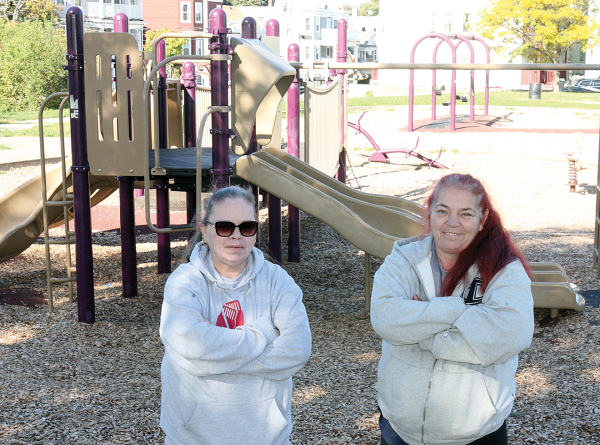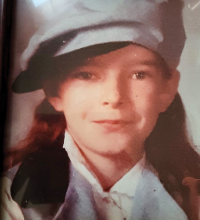October 26, 2023

Sisters Barbara Rose and Janet Kulka at the playground at Ronan Park that they hope will be named after their sister, Maryann Hanley, who, at age 11, was raped and murdered in another part of the park in 1983. Seth Daniel photo

A proposal to rename a playground in Ronan Park after the late Maryann Hanley, an 11-year-old girl who was raped and murdered in the park in 1983, continues to roil the neighborhood in controversy, with family members saying they won’t give up the cause and some community members still debating the appropriateness of the idea.
After an intense informal community meeting on the matter at Fields Corner Library on Oct. 19, Maryann’s sisters, Janet Kulka and Barbara Rose, said they were even more resolute in their position.
“I am not giving up on the playground,” said Kulka after the meeting. “Now they’re telling me to plant a tree or put a bench or a rock up there for her, but that makes no sense because you still have to explain to kids what happened, which is what they don’t like. They just don’t want the name on the playground, and they’re contradicting themselves, so I’m not giving up.”
For the past year, the sisters have led the effort to name the playground after Maryann, a place where she found happiness as a child. That effort progressed well until last month when some opposition arose, and the Parks Commission tabled a Sept. 26 vote on the matter.
The Oct. 19 meeting surfaced raw feelings from long ago and presented the question of whether it’s appropriate to name city spaces, particularly playgrounds, after childhood victims. There are several parks or fields named after children who have been killed, but none is also the scene of the crime.
The leader of the opposition, Linda Matranga, who grew up next to Ronan Park and lived there at the time of Hanley’s murder, called for the meeting. Also in attendance were several members of the Meetinghouse Hill Civic Association, which originally backed the proposal but pulled its support after hearing more details. For her part, Matranga also wants to address the larger citywide issue.
“We’re saying the playground is a child-safe zone, but on the entrance, we’re introducing a tragedy that happened there,” she said. “I’m not trying to take anything away; we’re just turning a place for child innocence into something not innocent when they go inside a safe zone.”
The meeting was lively and testy at times, with several heated exchanges on both sides from those who lived near Ronan Park in 1983, and those who have strong opinions about the concept. Some had to leave the room to compose themselves, and tears were shed on several occasions, a reminder that after 40 years, Maryann Hanley’s death remains heartbreaking and the trauma fresh.
Kulka, saying she did not understand the opposition, noted that her their mother had tried naming something after Maryann decades ago but was turned away. She said her petition this year seemed to be approved, but then was taken away.
“They named a park after Martin Richard – well deserved, and they named a park after Tiffany Moore – well deserved,” said Joanie Hanley, Maryann’s cousin. “For Maryann, it’s not even a park; it’s just the playground. Anybody that can say they’re against it, I think there’s some other reason … I think if Tiffany Moore can happen, Maryann Hanley should get the same respect.”
Representatives of the civic association offered a variety of opinions.
Linda Loska recalled moving near Ronan Park just before the murder and having a child who wanted to play in the park. She said she was hesitant. “As an outsider looking into the situation without a connection, I won’t say it was off-putting, but it was a thing,” she said. “It’s up to every parent to tell their child it can be dangerous in the park, but at the same time when you think it through, you’re like, ‘Oh, my God, my playground is named after a dead child.’ That’s so unhappy.”
Her husband, Ted Loska, noted that he had been a swim coach at Dorchester House at the time of the murder, and knew most of the kids and the genesis of the conflict that led to the crime.
“I see no harm in having the name of the person in their favorite place,” he said. “I realize kids don’t ask what names [on plaques] are all about. Some of these places named after these children were children I knew. It’s comforting for me to see the name as I walk by. It helps me remember.”
Meetinghouse Hill Civic President Jennifer Johnson noted that she didn’t grow up by Ronan Park and didn’t know the full history when she supported the naming. A presentation by Matranga changed her mind, and now she doesn’t feel it’s appropriate.
“I hate to say it this way, but frankly it’s gruesome,” she said. “It is gruesome to name any playground or park after a dead child that was murdered in that same park.”
At one point, the meeting went off the rails, and allegations of personal vendettas and grudges surfaced.
“It’s clear you guys are all still traumatized by what happened,” said Johnson. “Of course, we are,” said an emotional Kulka. “We’ve been living it 40 years. It’s traumatizing every day.” Responded Johnson: “We should find something that is a beautiful memory and memorial to Maryann without pulling the community apart.”
The vote at the Parks Commission is on hold indefinitely, and there was no indication at the meeting about when it might be picked up again. Kulka and Rose, though, said on Monday they will continue to push ahead with their cause.


